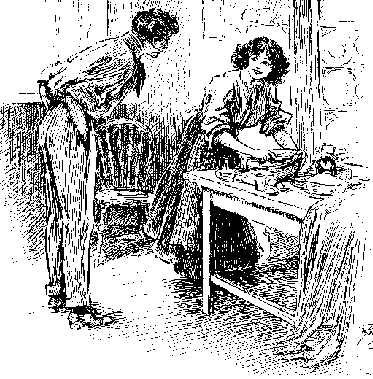Curmudgeon's Cookery - American Menu
![]()
 Homeopathic Soup
Homeopathic Soup
"Take two starved pigeons, hang them by a string in the kitchen window, so
that the sun will cast a shadow of the pigeons in an iron pot on the fire
holding ten gallons of water. Boil the shadow over a slow fire for ten hours,
and then give the patient one drop in a glass of water every ten
days." Scientific American August 1846.
Homeopathy is unscientific
medicine that treats disease or conditions with very minute doses of an active
ingredient, attenuated to something akin to one small drop in a very big lake of
water. The greater the dilution, the better, according to the homeopaths!
The story goes that a patient forgot to take his daily prescription of
homeopathic medicine, overdosed, and diedů
Shadow Soup
"Pick out a good thin chicken (Shanghai breed is the best); disrobe him of
his plumage; amputate his spurs; remove the comb from his head; confiscate his
tail feathers; place him in a strong sunlight; let the shadow reach across two
gallons of strained rain water in a shallow pan; let the shadow remain on the
surface of the water for 10 minutes; then take him by the bill and lead him
gently backwards and forwards through the water, three or four times; bring the
water to a sudden boil; season to suit the taste and serve up with a raw onion
and a bunch of wooden toothpicks.
This soup is very popular with boarding-house keepers and is said will cure the
dyspepsia, or kill the patient, I have forgot which." Uncle Sam's Uncle Josh Donald Day
Mason-Dixon Mix
"Dig a pit exactly
2 feet deep and 1 1/2 feet in diameter in red clay soil. Line the pit with aged
oak boards. Over a wood fire, in a big pot, bring 22 pounds of choice hominy to
a full boil. Pour the hominy into the pit. Stir well. Sprinkle 1/2 cup grated
Parmesan cheese on top. Cover with canvas. Let sit for 3 days. Cut into
bite-sized wedges. Garnish. Serves many." From the Official
Gourmet Handbook by Pasquale Bruno, Jr. This book is recommended for
finally disclosing the truth about pasta trees and Rocky Mountain oysters in the
chapter "All Mythed Up."
Lumberjack Hash
"Big John Marshall was a cook on one of Whisky Jack's rafts. He was a good enough
lumberjack cook, but one day the crew complained about the meals. They
were all pretty much the same, day after day.
Whisky Jack thought that the meals could be better, so he talked with Big John
and asked him whether he had ever had or seen a cook book. And the cook said, 'I got one of them cookery books once but I never could do anything with
it. It was just of no use to me.'
'Was it too fancy for you?' asked Jack. 'That was it,' said
big John, 'every one of the recipes began the same way, Take a Clean Dish. And that settled me.'
Big John dished up a lot of hash. It was good, and one
of the crew asked him if he had a regular recipe for making it. 'No,' said the cook,
'it just accumulates.'" Whisky Jack Yarns
Charles E. Brown 1940
Muir's Bread
"Sheep camp bread,
like most California camp bread, is baked in Dutch ovens, some of it in the form
of yeast powder biscuit, an unwholesome sticky compound leading straight to
dyspepsia. The greater part, however, is fermented with sour dough, a handful
from each batch being saved and put away in the mouth of the flour sack to
inoculate the next. The oven is simply a cast iron pot, about five inches deep
and from twelve to eighteen inches wide. After the batch has been mixed and
kneaded in a tin pan, the oven is slightly heated and rubbed with a piece of
tallow or pork rind. The dough is then placed in it, pressed out against the
sides, and left to rise.
When ready for baking a
shovelful of coals is spread out by the side of the fire and the oven set upon
them, while another shovelful is placed on top of the lid, which is raised from
time to time to see that the requisite amount of heat is being kept up. With
care good bread may be made in this way, though it is liable to be burned or be
sour, or raised too much, and the weight of the oven is a serious
objection."
My First Summer in the Sierra John Muir. Muir
(1838-1914) was a colorful character as well as a scientist, a visionary, and a
skillful, very entertaining writer. He wrote eight books and many articles, most
on the outdoors that he so truly loved.
Kermit McKemie mailto:kmckemie@astound.net
![]()